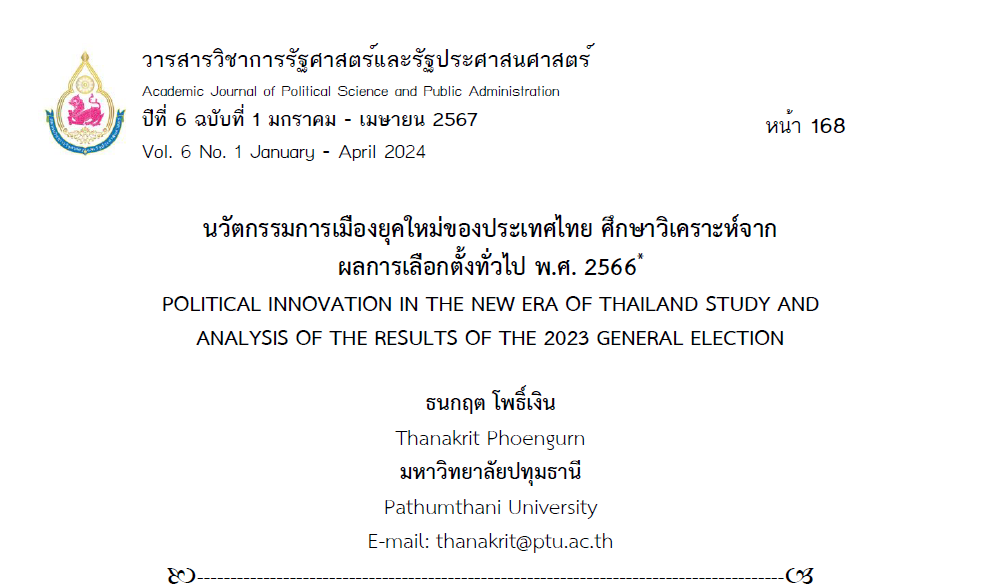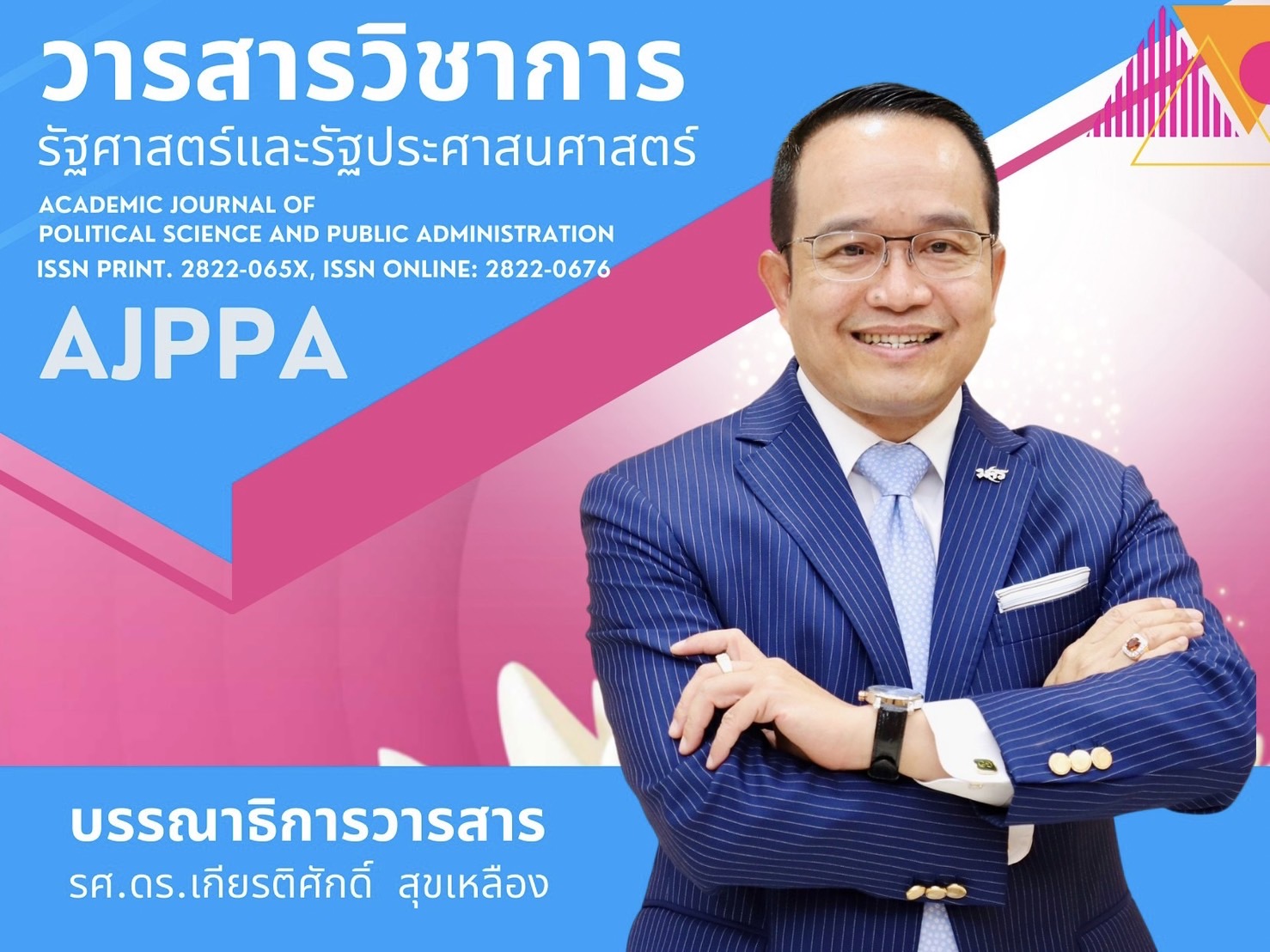นวัตกรรมการเมืองยุคใหม่ของประเทศไทย ศึกษาวิเคราะห์จาก ผลการเลือกตั้งทั่วไป พ.ศ. 2566
คำสำคัญ:
นวัตกรรม, การเมืองยุคใหม่, การเลือกตั้งทั่วไป, พรรคก้าวไกลบทคัดย่อ
วัตถุประสงค์ของบทความนี้ เพื่อศึกษานวัตกรรมทางการเมืองในการรณรงค์หาเสียงเลือกตั้งทั่วไป พ.ศ. 2566 การเลือกตั้งครั้งนี้ พรรคก้าวไกลมีการใช้นวัตกรรมทางการเมืองโดยการออกแบบนโยบายการเมืองและสาธารณะแบบก้าวกระโดดแตกต่างจากพรรคการเมืองอื่น เพื่อที่จะเผชิญกับการเปลี่ยนแปลงอย่างรวดเร็วของโลกทั้งด้านการเมือง เศรษฐกิจ สังคม เทคโนโลยี และมีการใช้สื่อสังคมออนไลน์เป็นเครื่องมือในการรณรงค์สื่อสารกับประชาชน ที่มีลักษณะ 1. ใช้ความแตกต่างจากวิธีการหาเสียงยุคเก่าโดยใช้นโยบายพรรคและภาวะผู้นำยุคใหม่ 2. เน้นการใช้สื่อสังคมออนไลน์ โดยเฉพาะติ๊กต็อก ยูทูป ที่ไม่ต้องจ่ายเงิน (ใช้ฟรี) เพื่อเข้าถึงผู้มีสิทธิเลือกตั้งเข้าใจและจดจำนโยบายและผู้สมัครของพรรค 3. ไม่ใช้เงินซื้อคะแนนเสียง 4. ใช้นโยบายนำและผู้นำเป็นคนหนุ่มที่ฉลาดตัวแทนคนรุ่นใหม่วัยหนุ่มสาว และ 5. เน้นย้ำผลงานการพูดในสภาผู้แทนราษฎรเป็นเวลา 4 ปีเต็ม นวัตกรรมทางการเมืองดังกล่าวส่งผลให้พรรคก้าวไกลซึ่งเข้าสู่การเลือกตั้งเพียงสมัยที่สองมีชัยชนะในการเลือกตั้งทั่วไปและได้คะแนนเสียงเป็นอันดับหนึ่ง โดยได้สมาชิกสภาผู้แทนราษฎร 151 คน จากผู้สมัครรับเลือกตั้งที่แข่งขันกัน 67 พรรคการเมือง ผลการเลือกตั้งของพรรคก้าวไกลเป็นการสร้างมิติทางการเมืองยุคใหม่ที่พรรคการเมืองและนักการเมือง รวมทั้งผู้ที่สนใจทางการเมืองสามารถใช้เป็นบทเรียนในการเลือกตั้งคราวต่อไป
เอกสารอ้างอิง
ไทยโพสต์. (2565). ขนลุกซู่! พิธาบอก 'ก้าวไกล' ไม่ตั้งเป้า ส.ส.แต่ขอมากกว่าที่ผ่านมาและมีทุกภูมิภาค. สืบค้น 19 กันยายน 2566, จากhttps://www.thaipost.net/politics-news/216976/
สมเด็จพระพุทธโฆษาจารย์ (ปอ.ปยุตโต). (2559). พจนานุกรมพุทธศาสน์ ฉบับประมวลศัพท์ (พิมพ์ครั้งที่ 30). กรุงเทพฯ: สำนักพิมพ์ผลิธัมม์.
สำนักข่าวอิศรา. (2565). ก้าวไกล' ชู 23 นโยบายปราบโกง พุ่งเป้ารื้อระบบ 'ราชการ – ตำรวจ. สืบค้น 24 ตุลาคม 2566, จาก https://www.isranews.org/article/ isranews-short-news/114313-isranews-970.html
หทัยกาญจน์ ตรีสุวรรณ. (2020). พรรคก้าวไกล : ทิม-พิธาประกาศสานต่ออุดมการณ์อนาคตใหม่ นำทีม 55 ส.ส. ย้าย “บ้านใหม่ หัวใจเดิม. สืบค้น 19 กันยายน 2566,จาก https://www.bbc.com/thai/51788851
Arıcı, A. (2015). Political communication in new media era: Research into social media performances of political parties and political party leaders. Marketing and Marketing Studies Journal, 15,49-67.
Aziz, A. (2003). Political communication. Ankara: Nobel Publishing.
Barker, A. (2002). Alchemy of innovation (trans. A. Kardam). İstanbul: Mess Pres.
BBC NEWS. (2023). เลือกตั้ง 2566 : สรุปนโยบายหาเสียง 9 พรรคหลัก ก่อนเลือกตั้ง 14 พ.ค. สืบค้น 24 ตุลาคม 2566, จาก https://www.bbc.com/thai/thailand-65307789
BBC NEWS. (2023). ผลเลือกตั้ง 2566 : กกต. ประกาศรับรอง ส.ส. ครบทั้งสภา 500 คน.สืบค้น 19 กันยายน 2566, จาก https://www.bbc.com/thai/
articles/c3g79jd8qj1o
Binder, L. (1978). The Study of the Middle East. New York: Van Nostrand Rienhold Company.
Castells, M. (1997). The power of identity. Oxford, UK: Blackwell.
Cogburn D. L., Espinoza F. K. (2011). From networked nominee to networked nation: Examining the impact of Web 2.0 and social media on political participation and civic engagement in the 2008 Obama campaign. Journal of Political Marketing, 10(1–2), 189–213.
Dahl, R.A. (1971). Political Opposition in Western Democracies. New Haven: Yale. University Press.
Diamond, L. (1999). Development Democracy: Toward Consolidation. Baltimore: The John Hopkins University Press.
Hobbes, T. (1651). Leviathan, Renascence Editions. Oregon: The University of Oregon.
Kellner, D. (1990). Television and the crisis of democracy. Boulder, CO: Westview.
Kılıçaslan, E. (2008). Political communication: Ideology and media relations. İstanbul: Kriter Publishing.
Kreiss D. (2012). Taking our country back: The crafting of networked politics from Howard Dean to Barack Obama.Oxford: Oxford University Press.
Market Think. (2023). รู้จักกับ User Generated Content กลยุทธ์ที่มีส่วนช่วยให้ ก้าวไกล “ชนะ” การเลือกตั้ง. สืบค้น 24 ตุลาคม 2566, จาก https://www.marketthink.co/40813
Meriç, Ö. (2017). A literature review on online political communication. Selçuk Communication, 9(4), 25-39.
Michels, A. (2011). Innovations in Democratic Governance: How Does Citizen Participation Contribute to a Better Democracy? International Review of Administrative Sciences, 77(2), 275–293.
O’Donnell, G. A. & Schmitter, P. C. (1986). Transitions from Authoritarian Rule: Tentative Conclusions About Uncertain Democracies, Baltimore, MD: Johns Hopkins University.
Öztürk, B. (2015). Use of printed media as a political communication actor: analysis of newspaper headlines in parliamentary elections dated 7 june 2015. Doctoral Dissertation: Gazi University Institute of Social Sciences.
Putnam, R. (2000). Bowling Alone: The Collapse and Revival of American Community. New York: Simon & Schuster.
Sartori, G. (1976). Liberty and Law, Menlo Park, California, Institute for Humane. Cambridge: Cambridge University Press.
Smith, G. (2009). Democratic Innovations: Designing Institutions for Citizen Participation. Cambridge: Cambridge University Press.
The Nation. (2023). Six parties embrace innovation as key tool to move Thailand forward. Retrieved 24 September 2023, from https://www.nationthailand.com/thailand/politics/40027193.
Umeh, George-Franklin. (2021). The Social Contracts of Thomas Hobbes and John Locke: A Comparative Analysis, Retrieved 24 October 2023, from https://acjol.org/index.php/ajap/article/view/1335/1310.
Uztuğ, F. (2007). Political communication management. Istanbul: MediaCat
Yazıcı, S. (2018). Innovation competition and state. Turkish Studies, 13,67-86.

ดาวน์โหลด
เผยแพร่แล้ว
รูปแบบการอ้างอิง
ฉบับ
ประเภทบทความ
หมวดหมู่
สัญญาอนุญาต
ลิขสิทธิ์ (c) 2024 วารสารวิชาการรัฐศาสตร์และรัฐประศาสนศาสตร์

อนุญาตภายใต้เงื่อนไข Creative Commons Attribution-NonCommercial-NoDerivatives 4.0 International License.




